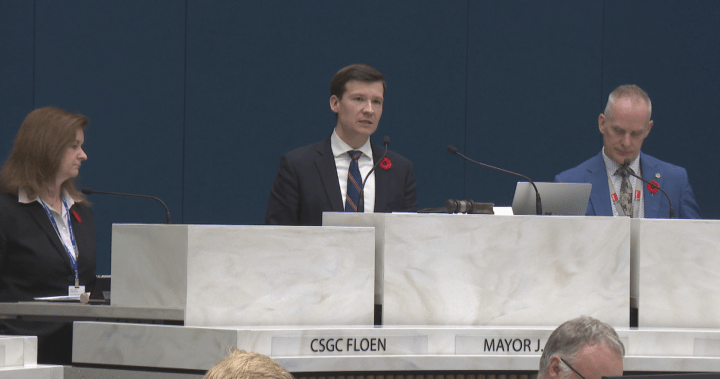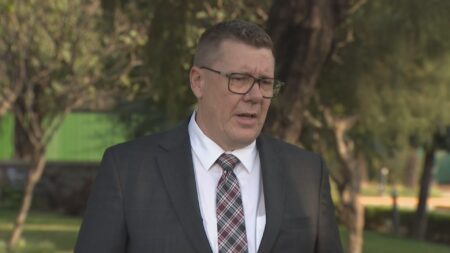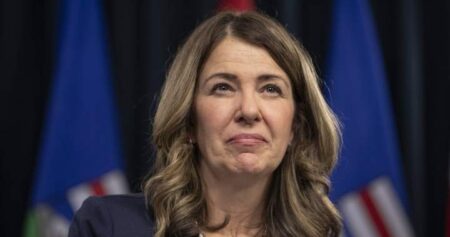Calgary city councillors officially got their first glance at the proposed 2026 city budget Monday ahead of deliberations later this month.
The budget proposal, which is the final year of a four-year budget approved by the previous city council, includes more than $300 million in new investments around transit, housing, infrastructure and public safety.
“This budget is about finding the right balance, maintaining affordability while continuing to invest in the core services that matter most to Calgarians,” the city’s chief administrative officer, David Duckworth, said to council during the presentation of the budget.
The proposal includes a 3.6-per cent overall property tax increase, a confine approved by the previous city council, but a figure that differs depending on property type.
Preliminary estimates show a typical single-family home assessed at $706,000 would see a 5.8-per cent property tax increase, while a condo valued at $348,000 would see a 1.3-per cent hike compared to 2025.
A commercial property valued at $5,562,000 could also expect a 1.3-per cent tax increase next year, according to budget documents.
“These are preliminary estimates only, and will be finalized when the assessment roll is finalized in January,” said the city’s chief financial officer Les Tochor.
“Even with these changes, Calgary remains one of Canada’s most affordable large cities.”
As proposed, the budget would result in an extra $18.40 per month for the typical residential property, which includes an additional $5.29 per month due to a proposed increase in waste and recycling fees as well as water utilities.

Get daily National news
Get the day’s top news, political, economic, and current affairs headlines, delivered to your inbox once a day.
However, Calgary Mayor Jeromy Farkas told reporters he is entering budget deliberations with “an aim” of cutting the proposed property tax increase by “half.”
“We’re looking at ways we can drive efficiencies so that we can still fund the needed investments around public safety, around transit, around housing and around infrastructure while also reducing the burden Calgarians are facing with this tax increase,” Farkas said Monday.
The proposed property tax increase is set to pay for a portion of the slew of investments included in next year’s budget, including $86.6 million for affordable housing, downtown office-to-residential conversions and for city growth.
The budget also proposes $66 million in new spending for public safety, including $28 million to make up the loss in fine revenue from the provincial removal of photo-radar.
$87.7 million in new investments are being proposed for infrastructure including facilities, streetlights, parks and the Plus 15 network; $24 million of that will be set aside for pavement rehabilitation.
Transit spending is also recommended to increase by $59 million including $14 million to increase frequency on key routes as well as $25 million to fund the gap for the low-income transit pass.
According to Tochor, the majority of the funding is coming from sources like “corporate contingencies,” the 2025 year-end surplus, and reserves.
Ward 6 Coun. John Pantazopolous, one of 10 new faces on council, said councillors will be “threading that needle” between finding efficiencies and maintaining city services.
“My caveat will be if we start seeing a deterioration in services, we just can’t have that,” he told reporters. “We have to have an improvement or worse case remain flat.”
Ward 10 Coun. Andre Chabot, meanwhile, said there’s “nothing” in the budget as proposed that could result in a 50 per cent cut to property taxes.
However, Chabot said he would be introducing in testing council’s will to reverse a proposed shift of the tax burden from businesses onto residential properties.
The budget proposes another one per cent property tax shift from non-residential to residential properties, previously approved by council, to keep the forecasted tax ratio at 4.48:1, below the provincially-legislated maximum of 5:1. The move is aimed at improving fairness for businesses.
“It’s mostly the downtown office towers, the (real estate investment trusts) and the multinationals that are benefiting from that tax shift,” Chabot said. “If you’re talking about small businesses, this shift of one per cent is not benefiting them.”
Council is set to reconvene on Nov. 24 to begin budget deliberations, which will be kickstarted with a public hearing on the proposed adjustments.
“Time is not on their side,” Duckworth told reporters. “They really have two weeks to ask administration lots of questions, to listen to their constituents, and to prepare their amendments.”
© 2025 Global News, a division of Corus Entertainment Inc.
Read the full article here














